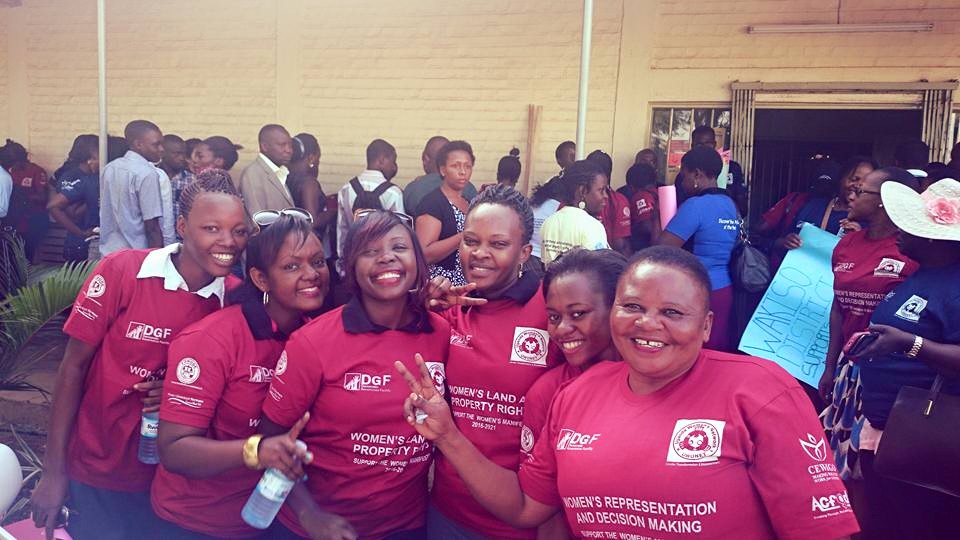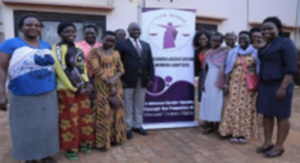Project
Enhancing Voices for formerly abducted Women & Children born in captivity
-
Amount Funded
100,000 EUROProject Duration
01 Aug 2017 - 31 Jul 2019 -
-
Lead organisation
-
FIDA Uganda is a membership based, feminist NGO formed as an association for women lawyers in 1974, registered as a company limited by guarantee in 1995 and as an NGO in 1999. It is a member of several networks and belongs to several human rights, legal aid providers and NGO networks at grassroots, national and international levels.
It is affiliated to FIDA International and associates with other FIDA chapters. FIDA has progressed from its initial goal of assisting widows to navigate through the Administrator General’s department to attain their legal inheritance rights, to a broader agenda of advancing women’s social, economic and political rights through legal aid, research, rights education, advocacy and strategic litigation. Over the years FIDA Uganda has influenced the content of government programmes and policies by providing technical support to government agencies in mainstreaming women’s rights. FIDA engaged in reforms of the law, policy and practice for the protection of women’s rights, holding the government accountable to its international commitments to gender equality, women’s rights and FIDA entrenched women’s rights in the public domain.
FIDA Uganda’s programme focus in its 2015-2020 Strategic Plan is Access to Justice for Women, Enhancing Gender Responsive Governance and Women’s Effective Participation in Public Life and Women’s Social Economic Justice. It uses a feminist, human rights based approach, conducting advocacy, legal education and rights awareness, alternative dispute resolution and strategic litigation. FIDA provides a holistic response to the needs of women and children specifically around livelihood, health and education through networking.
-
Organisation
FIDA Uganda is a membership based, feminist NGO formed as an association for women lawyers in 1974, registered as a company limited by guarantee in 1995 and as an NGO in 1999. It is a member of several networks and belongs to several human rights, legal aid providers and NGO networks at grassroots, national and international levels.
It is affiliated to FIDA International and associates with other FIDA chapters. FIDA has progressed from its initial goal of assisting widows to navigate through the Administrator General’s department to attain their legal inheritance rights, to a broader agenda of advancing women’s social, economic and political rights through legal aid, research, rights education, advocacy and strategic litigation. Over the years FIDA Uganda has influenced the content of government programmes and policies by providing technical support to government agencies in mainstreaming women’s rights. FIDA engaged in reforms of the law, policy and practice for the protection of women’s rights, holding the government accountable to its international commitments to gender equality, women’s rights and FIDA entrenched women’s rights in the public domain.
FIDA Uganda’s programme focus in its 2015-2020 Strategic Plan is Access to Justice for Women, Enhancing Gender Responsive Governance and Women’s Effective Participation in Public Life and Women’s Social Economic Justice. It uses a feminist, human rights based approach, conducting advocacy, legal education and rights awareness, alternative dispute resolution and strategic litigation. FIDA provides a holistic response to the needs of women and children specifically around livelihood, health and education through networking.
-
Project
The Enhancing Voices for formerly abducted Women & Children born in captivity project is developed with lessons learnt and gaps identified during the implementation of two projects; Promoting Gender Just Redress for Wartime Sexual Violations in Northern Uganda and Accountability and Redress for Victims of Sexual Violence in Post-conflict Northern Uganda.
This project bridges the gaps from the earlier projects. These interventions have been inadequate in addressing the needs of former abductees and their children born while in captivity, land issues they face and limited agency in public spaces. The project increases the efforts of humanitarian agencies supporting the large refugee population in northern Uganda by facilitating access to justice around sexual and gender based violence (SGBV).
Activities under this project promote the participation and voice of formerly abducted women and children born in captivity in public spaces; strengthens the legal and policy framework protecting land rights for former abductees and children born in captivity; and enhances access to justice for refugee women and girls who are victims of Sexual and Gender Based Violence (SGBV). This happens through community dialogues, media engagement, dialogues with policy makers and regulators, accountability forums with duty bearers, documentation of post conflict oral testimonies of experiences of the target group, training of refugee paralegals and building the capacity of local law enforcement agents to facilitate access to justice.
The interventions strengthens social support structures for the target groups, thereby reducing stigma, fostering reconciliation and peace building.
-
-
The Enhancing Voices for formerly abducted Women & Children born in captivity project is developed with lessons learnt and gaps identified during the implementation of two projects; Promoting Gender Just Redress for Wartime Sexual Violations in Northern Uganda and Accountability and Redress for Victims of Sexual Violence in Post-conflict Northern Uganda.
This project bridges the gaps from the earlier projects. These interventions have been inadequate in addressing the needs of former abductees and their children born while in captivity, land issues they face and limited agency in public spaces. The project increases the efforts of humanitarian agencies supporting the large refugee population in northern Uganda by facilitating access to justice around sexual and gender based violence (SGBV).
Activities under this project promote the participation and voice of formerly abducted women and children born in captivity in public spaces; strengthens the legal and policy framework protecting land rights for former abductees and children born in captivity; and enhances access to justice for refugee women and girls who are victims of Sexual and Gender Based Violence (SGBV). This happens through community dialogues, media engagement, dialogues with policy makers and regulators, accountability forums with duty bearers, documentation of post conflict oral testimonies of experiences of the target group, training of refugee paralegals and building the capacity of local law enforcement agents to facilitate access to justice.
The interventions strengthens social support structures for the target groups, thereby reducing stigma, fostering reconciliation and peace building.
-
International human rights law recognizes that victims of state violations of human rights have a right to reparations by the state. Since the cessation of the LRA war in Northern Uganda, the government, victims’ groups, and civil society have been dialoging about the national policy on transitional justice that includes reparations for victims in the north given the magnitude of serious violations that were committed. The Voice project worked with district leaders, non-state actors to undertake dialogue with government to endorse the transitional justice law. In 2019, more than 10 years after the peace talks ended, Uganda’s Cabinet finally approved the long-awaited National Transitional Justice Policy (TJ).
FIDA through funding from Voice is one of the CSOs that worked tirelessly to ensure approval of the transitional justice policy. The project strengthened linkages between the government, civil society and victims in Gulu District leading to commencement of a constructive dialogue with the executive to reawaken the transitional justice policy. The policy guarantees restitution, compensation for the victims, rehabilitation and satisfaction and guarantees non-repetition, acknowledgement and state responsibility in protecting the citizens.
FIDA held several advocacy meetings with District leaders in Gulu and Kitgum as well as CSOs and victims to lay strategies on how the transitional justice policy would be approved.
In one of the advocacy meetings, Mr. Okot Lapolo stated – “that the reparation policy was born out of the Juba Peace talk, which binds government of Uganda to enforce that clause”.
Discussions with leaders also focused on shedding a spotlight on the several challenges faced by returnees. In partnership with Gulu district local government, FIDA held an accountability forum at Gulu district council hall with members of parliament under the theme: “Reflections on recovery in northern Uganda”. This provided a platform for 30 formerly abducted women from Awach and Patiko to interface with the duty bearers and amplify their voices. Through this forum, the district leaders were able to acknowledge that Children born in captivity and their mothers continue to suffer because while they were encouraged to return, there has always been limited support for their reintegration. They also acknowledged that there have been no specific interventions targeting women returnees and their children and therefore there is need to prioritize their issues. The leaders publicly committed to advocate and lobby for support for programs that target the formerly abducted women and their children. Some of the commitments also included prioritizing women returnees in government programmes such as Uganda women entrepreneurship program, Operation wealth creation.
After the accountability forum, the Senior Labour Officer of Gulu District (Ms. Jackie Piloya) who is in charge of registering women groups for UWEP Funds reached out to FIDA Uganda to identify the groups of women returnees in Awach and Patiko sub-county in order to register them as beneficiaries for the funds and she committed that their applications will be prioritized.
Member of Parliament Gulu Municipality (Hon. Lyandro Komakech) documenting the issues raised by the women returnees and his public commitment to table the issues before Parliament for redress.

Group of women returnees amplifying their voices to the member parliament Gulu municipality Hon. Lyandro Komakech At community level, FIDA held several community awareness and advocacy meetings to challenge the act of discrimination of former abductees in Patiko sub county, Gulu District, Lukung sub county in Lamwo District targeting returnees, local leaders and women. The project used drama to demonstrate the land related violations suffered by women returnees and their children. The drama by KA IN KONO drama group stimulated discussions on Techniques to confront and challenge stereotypes and the negative perceptions about formerly abducted women and children born in captivity. The dialogue also increased community awareness on land injustice towards formerly abducted women and children. As a result, 16 local leaders who attended the dialogue in Patiko together with the community members generated action points and approaches which led to the signing of a memorandum of understanding committing themselves as leaders to protect the women returnees and their children of violence.
In Lukung Sub-county in Lamwo District, the community together with the leaders agreed to enact and pass a bye-law prohibiting discrimination and stigmatization of formerly abducted women and their children and ensure protection and promotion of women and children’s land rights and the rights in general. The community also resolved to support the education of the children born out of captivity.
FIDA Uganda conducted a multi -sectoral mobile legal aid clinic in a resettlement camp in Lamwo District which has had very many cases of SGBV. The mobile legal clinic provided an opportunity for the refugee community to interact with the justice actors in order to enable the communities better understand their justice roles and mandate in addressing gender based violence Through the multi sectoral mobile legal aid clinics, FIDA Uganda enhanced its networks and this culminated into the formation of the (SGBV working group) with the various justice actors, there was also increased community understanding of SGBV prevention, Control and case referral pathway. Through this activity, the refugees were able to directly consult different partners on their justice needs, health related needs and psychosocial support. The legal clinic continues to provide the much-needed legal services to returnees in the districts.




